Examples of Jury Nullification Throughout History
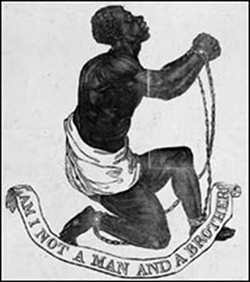 |
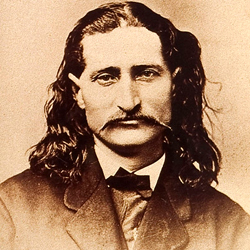 |
 |
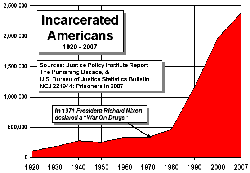 |
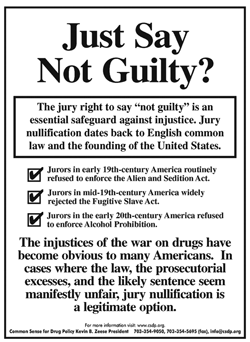 |
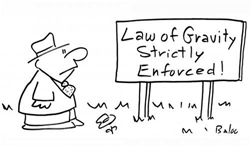 |
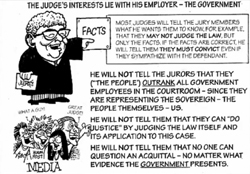 |
1215
The Barons of England compelled King John to sign the Magna Carta and trial by jury was established. The King thereafter had to seek permission from the people before he could take someone's freedom away.
The jury ended the absolute power of kings.
1670
William Penn and William Mead were prosecuted for preaching the Quaker religion which was against the law in England.
The judge instructed the jury to return a guilty verdict since the men were plainly guilty.
Four jurors, led by Edward Bushell, refused to return the guilty verdict. The judge ordered the jury imprisoned. For two days, the jury refused to return a guilty verdict. The judge ended the trial and ordered the jurors imprisoned until they paid a fine. Bushell refused and spent months in jail. He was eventually released after his habeas corpus petition prompted the Court of Common Pleas chief judge to rule that a jury cannot be punished for their verdict.
Penn and Mead went free and this precedent established freedom of religion.
1692
The Salem Witch Trials began in 1692. After a 100 percent conviction rate and the execution of 33 witches, in 1693, juries decided the court of Oyer and Terminer had gone too far. The next 52 trials ended in hung juries or acquittals. Frustrated, prosecutors ceased bringing cases to trial. Juries made it impossible to kill witches in Salem.
1734
John Peter Zenger’s newspaper criticized the Governor of New York. It was against the law to criticize the government in Colonial America. The Brits charged Zenger with seditious libel. At his trial, Zenger’s lawyer, Andrew Hamilton, admitted Zenger broke the law but asked the jury to acquit because Zenger told the truth.
Chief Justice James Delaney disagreed. "The truth is no defense," he ruled.
Hamilton told the jury they “have the right… to determine both the law and the fact.” He said if jurors cannot nullify laws, then "juries (are) useless . . . The next step would make the people slaves."
The jury found Zenger not guilty and established freedom of the press in America.
This verdict and the transcripts of the trial were widely published and encouraged literature critical of England by Franklin, Paine and others which spurred the revolution. If Zenger’s jurors obeyed the judge’s directions, America might still be under British rule.
1850
The fugitive slave law was enacted to help keep slaves who were illegally running away from getting help from abolitionists in the North.
In Syracuse, N.Y., 24 people were indicted for helping a slave escape from jail. A federal judge in Buffalo called the defendants "disturbers of society." Four jury trials ended in three acquittals and compelled the government to drop the charges.
In 1851, a crowd broke into a Boston courtroom, grabbed a slave named Shadrach Minkins and turned him loose. The judge called the defendants’ actions in that case "beyond the scope of human reason."
President Millard Fillmore demanded prosecution. A grand jury indicted three people. After one acquittal and several hung juries, the government was forced to drop all charges.
Because of juries, a network of people organized, knowing northern juries would not convict them. The Southern States seceded. Civil War followed, then the Emancipation Proclamation. If northern juries had followed the law as judges directed, African Americans might still be human property in accordance with federal law.
1865
In Springfield, Mo., Davis Tutt engaged in a one-on-one pistol, quick draw duel with William Hickok. Tutt was killed. Hickok was charged with manslaughter. Mutual combat was against the law.
Witnesses claimed both men fired, but Tutt was the initiator and aggressor. Hickok claimed it was a question of honor. Had Hickok not fought, he would have been branded a coward.
Judge Sempronius Boyd instructed the jury that a conviction was its only option under the law, but added that the jury could call upon a more ancient law, the unwritten law of the "fair fight" and acquit.
The jury acquitted Hickok, who became better known as Wild Bill Hickok.
1920
The US Constitution was amended to prohibit the sale of alcohol because a majority who did not drink wished to impose their morals on the minority of citizens who did. Juries however nullified alcohol control laws about 60 percent of the time. The fact that most juries would not convict on alcohol control laws made the use of alcohol widespread throughout Prohibition. Ultimately jury nullification led to the adoption of the 21st amendment repealing Prohibition.
If juries had obeyed the judge's instructions that "the law is the law," alcohol might still be illegal today.
1890s
In the late 19th century, prosecutions on "conspiracy" charges against striking union workers were quashed by jury nullification and gave unions the right to organize, assemble, and go on strike.
The rights of unions were safeguarded in America by juries.